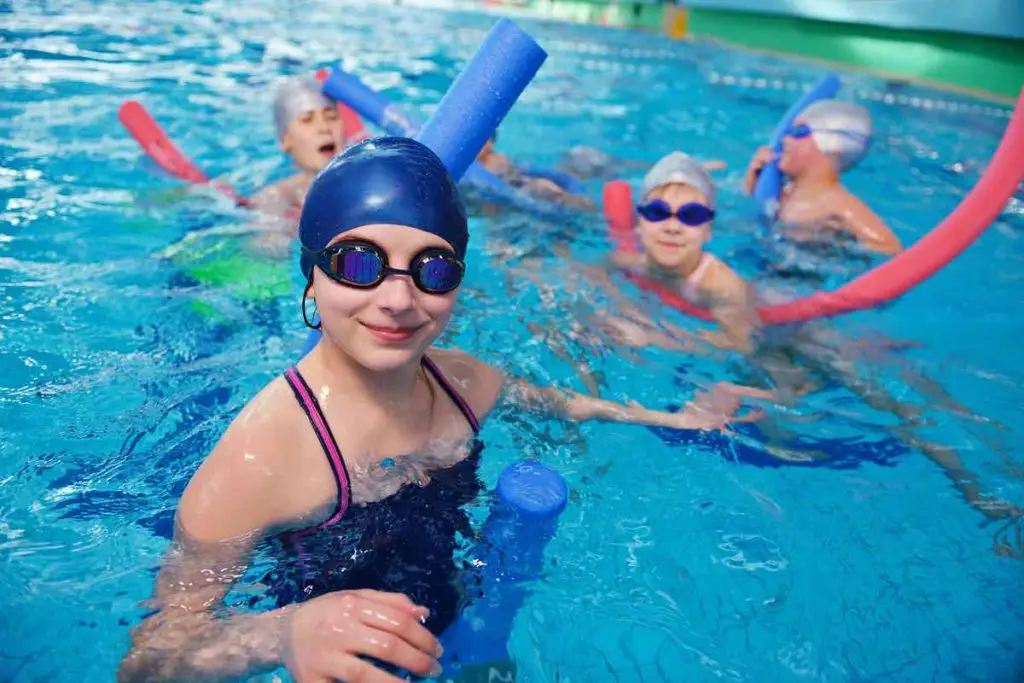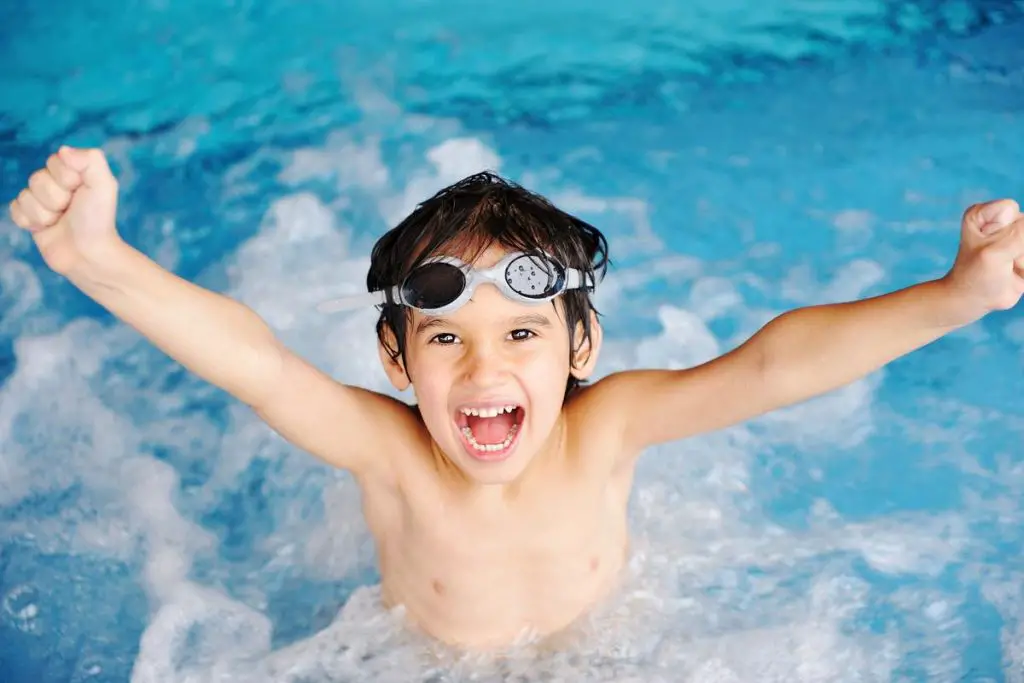The sparkling blue water of a swimming pool has an inviting appeal, making any child or adult want to jump right in. Any water-loving individual can spend hours floating around in pool water without any worries. However, how long can you safely stay in the swimming pool?
You can safely stay in the swimming pool for two hours. The duration varies depending on several factors, such as your age, health, the weather, and the chlorine content of the pool water. However, an average adult shouldn’t spend longer than two hours in pool water without respite.
In the rest of the article, I will discuss the factors that affect how long you can stay in the swimming pool. I will also explain the downsides of staying in the pool too long. Let’s dive right in!

Factors Affecting How Long You Can Safely Stay in the Swimming Pool
You may have seen in the movies or heard on the news about some people staying in the ocean for several hours or even days before being rescued. While possible, it is not without repercussions for their health.
Meanwhile, there’s no definite answer about how long you can safely stay in the swimming pool. Various swimming pools have different water compositions, and every swimmer has varied limitations.
Let’s go through some of the factors to consider below:
The Chlorine Content Pool Water
There are two major types of swimming pools based on the water composition: saltwater and chlorinated. They both contain chlorine, which is essential for sanitizing the water.
- Saltwater Pool. The water in this kind of pool contains approximately ten times less salt than seawater. It may also have less chlorine than a conventional chlorinated pool because the chlorine content of saltwater pools comes from dissolved salt (NaCl).
- Chlorinated Pool. The chlorine for this kind of pool comes from various substances or compounds, such as sodium hypochlorite. Once dissolved in water, they produce hypochlorous acid and hypochlorite ions, which work as a pool water disinfectant.
A healthy adult can stay in the saltwater or chlorinated pool for two hours and spend at least an hour away from the pool for rehydration. The break can also help your muscles recover if you’ve been swimming laps.
Chlorinated pool water should be odorless because it typically contains free available chlorine (FAC) levels of 1-2 ppm (part per million). However, if the chlorinated pool starts smelling strongly of chlorine, swimmers may need to shorten their stay in the water.
Here are the reasons why there’s a strong odor in swimming pools:
- Chloramines have an unpleasant smell. They form from the reaction between chlorine and pool contaminants like sweat, urine, and sunscreen. It means that the amount of FAC necessary to kill germs is significantly reduced, and the water becomes less safe.
- Chlorine gas release due to mechanical or electrical problems. Some accidents can happen wherein the chlorine-pumping mechanism malfunctions, resulting in the release of chlorine gas. Exposure to high concentrations of chlorine gas (400 ppm) can be fatal after 30 minutes.
So if you smell strong odors coming from the pool before going in, you can ask the pool attendant or expert to check. On the other hand, if the water starts smelling strongly of chemicals after you’ve spent some time in it, step out of the pool right away and call the attention of the pool manager.
Age
People of different ages behave differently and have varied physical limitations, affecting how long they can safely stay in the swimming pool.
Babies and Toddlers
Young kids aged a few months to four years old must be allowed to stay in the water for only 20-30 minutes under supervision. They should be taken out of the pool for a toilet break and refreshments.
Ideally, you should reapply sunscreen every hour and wait 20 minutes before going back into the water. However, since children’s skin tends to be more sensitive than adults, you may want to limit the application to twice a day.
It means they can safely stay in the pool for 20-30 minutes at a time, take at least an hour break, and head back in for another 20-30 minutes. In total, that’ll be 40-60 minutes of pool time in a day.
However, every parent knows that this can be challenging for over-enthusiastic kids. It takes patience and proper discipline to educate children about their limitations.
Children and Adults
Toilet-trained kids can stay as long as adults in the swimming pool. It’s important to teach your kids to avoid peeing in the water and let you know when they need to go to the toilet. It can help prevent slow down chloramine buildup in the pool.
Four to twelve-year-old kids need adult supervision and must be allowed to swim in kiddie pools. Well-trained young swimmers may require less supervision but need adult intervention to remind them to take a break every two hours.
Over 55
The risk for skin cancer can increase with age. Although it can also affect young people, the risk is directly proportional to age, and people over 50 are more susceptible.
Sunscreen can help protect your skin from the harmful rays of the sun. However, their effects typically last only 80 minutes under dry conditions. In the water, it can be significantly shorter. Therefore, people over 55 may need to spend a shorter time in the water to be safe.
To err on the side of caution, people in this age group must not stay longer than 30 minutes in the swimming pool on a particularly sunny day. And when outside of the water, it’s best to stay under the shade.
Health Conditions
Regardless of age, swimmers with asthma or skin allergies must stay in the pool for only 15 minutes at a time. It can help reduce the risk of adverse reactions to pool chemicals.
It can be more dangerous for people with health conditions to swim in a pool with many other swimmers because the FAC can be used up more quickly and turned into chloramines. The resulting odors and chemicals in the water can aggravate their symptoms.
People with a genetic history of skin cancer are more likely to suffer from the harmful effects of extended sun exposure. Therefore, this group of people must limit their stay in the swimming pool to 30 minutes.
Weather
As discussed, the effects of sunscreens last relatively shorter when you’re in the water than on land. Moreover, using sunscreen with a higher SPF (sun protection factor) doesn’t guarantee absolute protection.
On bright sunny days with temperatures over 86°F (30°C), especially in the peak of the summer, you must limit your time in the swimming pool to one hour. It’s also better to swim early in the morning or shortly before sunset as long as the water temperatures are well within the 78-86°F (25.5-30°C) range.
If you have age or health restrictions mentioned above, it’s best to stay in the water for ten minutes and take an hour’s break between pool dips.

Final Thoughts
While the time limits recommended above seem too strict, they can help you stay safe while enjoying your time at the swimming pool. Of course, you can stay longer than recommended, but the risks can increase the longer you stay in the water.
Evaluate your personal limitations and be vigilant about the changes in pool water odor and the sun’s intensity. Paying attention to these factors can help you ensure your family’s safety.
Sources
- Better Health Channel: Sunburn
- Healthline: What Are The Pros and Cons of Saltwater Pools?
- CDC: Facts About Chlorine
- ChemicalSafetyFacts.org: How Chlorine Keeps Pools Safe for Summertime Fun
- American Chemistry Council: An Industry Initiative to Help Keep Swimming Pools Safe
- CDC: Water Treatment and Testing
- ChemicalSafetyFacts.org: Chloraminse: Understanding “Pool Smell”
- National Library of Medicine: Chlorine Gas Inhalation
- Queensland Government: Going Swimming? Here’s how to get the most of your sunscreen
- Cancer Research UK: Melanoma skin cancer incidence statistics
- US Masters Swimming: What’s a Safe Pool Temperature?
